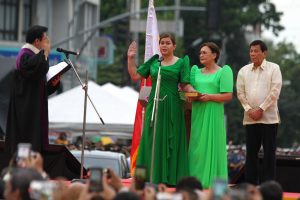Sara Duterte-Carpio, the daughter of the Philippines’ outgoing President Rodrigo Duterte, was on Sunday sworn in as the country’s vice president, following a crushing victory at elections last month.
In what the Associated Press described as a “heavily guarded ceremony” at a public square near city hall in the southern Philippine port city of Davao, Duterte-Carpio swore on a Bible held by her mother, in the presence of Supreme Court Justice Ramon Paul Hernando, as President Duterte stood by.
“I’m not the best or the most intelligent person in the Philippines and the world but nobody can beat the toughness of my heart as a Filipino,” Duterte-Carpio told thousands of supporters after taking the oath, according to the AP.
“The voice of 32.2 million Filipinos was loud and clear – with the message to serve our motherland,” she added, to applause.
The inauguration comes two weeks before Duterte-Carpio officially assumes office at noon on June 30. Her political ally and presidential running mate, Ferdinand Marcos Jr., is scheduled to be inaugurated the same day. In addition to serving as vice president, the 44-year-old is expected to serve as education secretary in the new administration.
As alluded to in her speech, the president’s daughter won the votes of 32.2 million Filipinos, or an astonishing 61.5 percent of those who took part, compared to just 9.3 million (17.82 percent) to second-placed Kiko Pangilinan. The margin of victory was the largest in the post-1986 era, and since Noli de Castro won 49.8 percent of the vote in 2004.
This exceeded even the margin of her presidential running mate, Ferdinand Marcos Jr., who will take his oath in the capital Manila on June 30. Marcos won 31.6 million votes, or 58.8 percent, in the May 9 polls.
Duterte-Carpio currently serves as mayor of Davao City on the southern Philippine island of Mindanao, a position held by her father for more than two decades. During those years, he honed the brutal approach to crime, particularly illegal narcotics, that he took to the national stage after his victory in the 2016 election.
Her leap to the vice presidency sets her up the possibility that she might follow her father’s footsteps to the presidency itself in 2028; last year, Duterte-Carpio headed opinion polls on preferred presidential candidates. Even if she does not succeed in taking that final step, the victory of the Marcos-Duterte ticket is a sign that Philippines’ politics, at both the national and regional level, remains overwhelmingly a family affair.
In addition to the jaw-dropping return of the Marcos clan to the pinnacle of Philippine politics, the AP notes that one of the president’s sons, Sebastian Duterte, is in line to succeed his sister as mayor of Davao City, while another son, Paolo Duterte, won a seat in the House of Representatives in last month’s election. This is all despite the Philippines’ Constitution banning “political dynasties.”
Attention now turns to how the duo will actually govern once in office. While Duterte-Carpio’s inauguration speech was filled with acknowledgements of the many challenges that the administration will inherit, including poverty, spiraling food prices, and the scourge of illegal drugs, her and Marcos’ campaign gave no idea of how they would address these issues, instead leaning heavily on feel-good platitudes about “national unity” that gives little indication of how she will govern.
One thing is almost certain: the incoming administration will do little to address the human rights abuses and other atrocities associated with their respective political clans. Marcos’ father, the late dictator Ferdinand E. Marcos, was responsible for a period of Martial Law that saw thousands arrested and killed, and billions sucked from the national accounts, and many activists fear that a new Marcos presidency will see this effaced from the public record. Meanwhile, it is hard to see there being any form of macro-accountability for the excesses of Duterte’s “war on drugs,” whose toll of extrajudicial executions has by some counts exceeded the body count of the Martial Law period. (Rappler has a detailed assessment of the outgoing president’s legacy here.)
However they approach issues like poverty and inflation, the public comments of the Philippines’s new top leaders make it clear that their version of national “unity” also means an enforced national consensus on some of the darkest episodes of the country’s recent history.

































